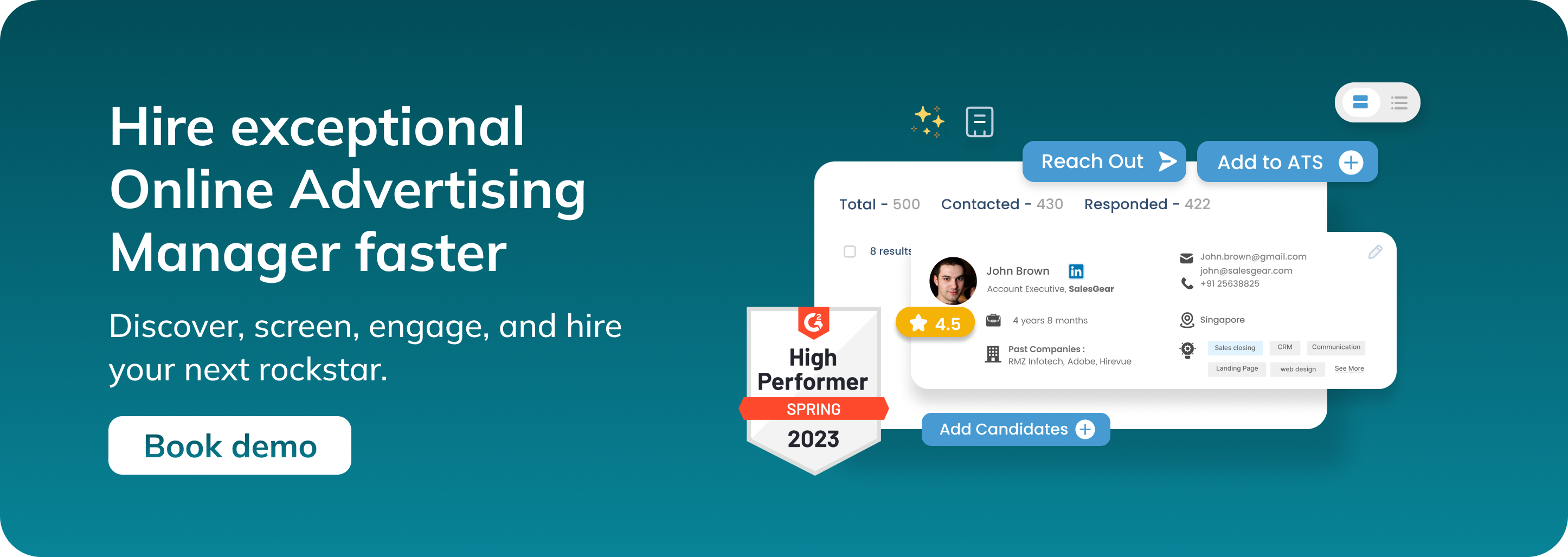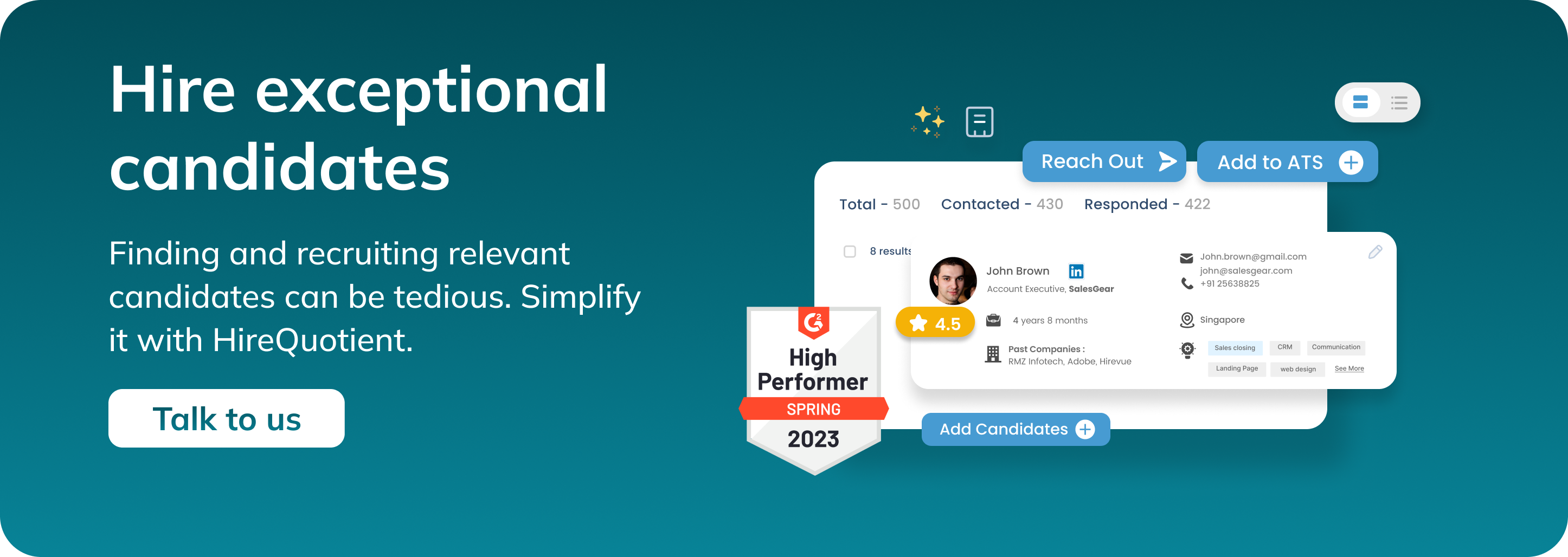Online Advertising Manager Interview Questions & Answers
Published on January 31st, 2024
As a recruiter, finding the right Online Advertising Manager is pivotal for driving successful digital marketing campaigns. Whether you're hiring an entry-level candidate or an experienced professional, asking the right questions during the interview process is crucial to assess their skills, knowledge, and suitability for the role. Here are 50+ interview questions and answers tailored for Online Advertising Managers
Entry-level online advertising interview questions
1. What do you understand by online advertising, and why is it important in today's digital landscape?
Answer: Online advertising involves promoting products or services using internet-based platforms. It's crucial as it helps businesses reach a wider audience, target specific demographics, and track performance in real-time.
2. Can you explain the difference between PPC and CPM advertising models?
Answer: PPC (Pay-Per-Click) charges advertisers each time a user clicks on their ad, while CPM (Cost-Per-Mille) charges per thousand impressions, irrespective of clicks.
3. What online advertising platforms are you familiar with?
Answer: Common platforms include Google Ads, Facebook Ads, Instagram Ads, LinkedIn Ads, Twitter Ads, and Bing Ads.
4. How do you determine the target audience for an online advertising campaign?
Answer: Understanding demographics, interests, behaviors, and location helps in defining the target audience. Utilizing data analytics and market research can assist in this process.
5. Describe a successful online advertising campaign you've previously worked on. What was your role, and what were the results?
Answer: The candidate should describe a campaign they were involved in, highlighting their responsibilities, the strategies employed, and the outcomes achieved, such as increased click-through rates, conversions, or brand visibility.
6. How do you optimize ad copy and creative elements for better performance?
Answer: Ad copy should be compelling, concise, and relevant to the target audience, while creative elements should align with the brand and evoke emotions or actions from users.
7. What metrics do you use to measure the success of online advertising campaigns?
Answer: Metrics include click-through rate (CTR), conversion rate, return on ad spend (ROAS), cost per acquisition (CPA), and engagement metrics like likes, shares, and comments.
8. How do you conduct keyword research for PPC campaigns?
Answer: Using keyword research tools like Google Keyword Planner or SEMrush, analyzing competitor keywords, and considering search volume, competition, and relevance to the business.
9. What steps do you take to stay updated with the latest trends and changes in online advertising platforms?
Answer: Continuous learning through industry blogs, attending webinars, joining online communities, and participating in workshops or certifications.
10. How do you handle a campaign that is not performing as expected?
Answer: Diagnosing issues by analyzing data, adjusting targeting parameters, refining ad copy, testing different creatives, and exploring new strategies to optimize performance.
11. Can you explain the concept of ad retargeting and how it can benefit a campaign?
Answer: Ad retargeting targets users who have previously interacted with a brand's website or app, reminding them of products/services they viewed but didn't purchase. It increases brand recall and encourages conversions.
12. What factors do you consider when budgeting for an online advertising campaign?
Answer: Factors include campaign objectives, target audience size, bidding strategy, ad placement, seasonality, and available resources.
13. How do you ensure compliance with privacy regulations, such as GDPR, when running online advertising campaigns?
Answer: Adhering to data protection laws by obtaining user consent, providing opt-out options, and ensuring secure data handling practices.
14. Describe a time when you had to manage multiple advertising campaigns simultaneously. How did you prioritize tasks and ensure deadlines were met?
Answer: The candidate should discuss their organizational skills, time management strategies, and ability to delegate tasks effectively to meet campaign objectives within deadlines.
15. What do you think are the most important elements of a successful landing page for an online advertising campaign?
Answer: A clear call-to-action (CTA), relevant and engaging content, fast loading times, mobile responsiveness, and a user-friendly layout contribute to a successful landing page.
16. How do you approach A/B testing in online advertising?
Answer: A/B testing involves creating variations of ad elements (such as headlines, images, or CTA buttons) to compare performance and determine the most effective combination for achieving campaign goals.
17. How do you analyze competitor advertising strategies, and how does it inform your own campaigns?
Answer: Analyzing competitor ads, messaging, targeting, and landing pages provides insights into industry trends, audience preferences, and potential areas for differentiation or improvement in our own campaigns.
18. Describe a time when you had to deal with a negative feedback or comment on a social media ad. How did you handle it?
Answer: The candidate should demonstrate their ability to respond professionally, address concerns or complaints promptly, and resolve issues while maintaining the brand's reputation and integrity.
19. What role do data analytics play in online advertising, and how do you utilize data to make informed decisions?
Answer: Data analytics help in tracking campaign performance, identifying trends, understanding user behavior, and optimizing strategies to maximize ROI and achieve business objectives.
20. How do you assess the effectiveness of different ad formats (e.g., display ads, video ads, text ads) in achieving campaign goals?
Answer: Testing different ad formats, analyzing performance metrics, and aligning ad formats with campaign objectives and target audience preferences help in determining effectiveness.
Mid-level online advertising interview questions
21. Can you describe your experience managing online advertising campaigns across multiple platforms?
Answer: Provide details about the platforms you've worked with, the types of campaigns you've managed, and the results achieved.
22. How do you approach audience segmentation and targeting in online advertising campaigns?
Answer: Discuss strategies for segmenting audiences based on demographics, interests, behaviors, and how you tailor ad messaging and creatives to each segment.
23. Describe a time when you had to optimize a campaign for better performance. What steps did you take, and what were the outcomes?
Answer: Share a specific example of a campaign you optimized, the metrics you focused on, the changes you made, and the improvements observed in performance.
24. How do you conduct A/B testing for online advertising campaigns, and what metrics do you analyze to determine the winning variant?
Answer: Explain your process for setting up A/B tests, the elements you test, and how you interpret metrics like CTR, conversion rate, and ROAS to identify the winning variant.
25. How do you stay updated with changes in online advertising platforms and industry trends?
Answer: Discuss your sources for industry news, attending conferences, participating in webinars, and joining professional groups to stay informed about emerging trends and updates.
26. What tools and technologies do you use to track and measure the performance of online advertising campaigns?
Answer: Mention analytics platforms like Google Analytics, ad platforms' built-in analytics, conversion tracking tools, and any other relevant technologies you utilize.
27. Can you share a successful cross-channel advertising campaign you've managed? What channels did you incorporate, and what was the strategy behind it?
Answer: Describe a campaign that leveraged multiple channels like search, social, display, and email, the objectives behind the campaign, and the coordinated strategy across channels.
28. How do you approach budget allocation and bidding strategies for online advertising campaigns?
Answer: Discuss your process for determining budget distribution across campaigns, bidding strategies for different objectives, and how you optimize bids to maximize ROI.
29. Describe your experience with retargeting campaigns. How do you segment retargeting audiences, and what tactics do you employ to drive conversions?
Answer: Explain your approach to segmenting retargeting audiences based on behavior, engagement levels, and site interactions, and the strategies you use to encourage conversions.
30. How do you ensure ad copy and creative elements remain fresh and engaging for target audiences?
Answer: Talk about your methods for testing new ad copy and creatives, monitoring ad fatigue, and refreshing content to maintain audience interest and engagement.
31. How do you handle changes in campaign performance metrics? Can you give an example of when you needed to pivot your strategy based on data analysis?
Answer: Describe how you analyze performance metrics to identify trends or anomalies, the process for diagnosing issues, and the adjustments you make to the campaign strategy.
32. What strategies do you employ to increase ad relevancy and quality score in platforms like Google Ads or Facebook Ads?
Answer: Discuss tactics like keyword optimization, ad copy relevance, landing page experience improvements, and audience targeting refinements to boost ad quality scores.
33. How do you integrate online advertising campaigns with broader marketing initiatives and objectives?
Answer: Explain how you collaborate with other marketing teams, align campaign messaging and objectives with overall marketing goals, and ensure consistency across channels.
34. Can you share your experience with analyzing competitors' advertising strategies and how you use that insight to inform your own campaigns?
Answer: Discuss your methods for monitoring competitor ads, identifying trends or gaps in their strategies, and adjusting your campaigns accordingly to capitalize on opportunities.
36. What role does data privacy play in online advertising, and how do you ensure compliance with relevant regulations?
Answer: Highlight your understanding of data privacy laws like GDPR and CCPA, and your approach to obtaining user consent, protecting data, and respecting privacy preferences in ad targeting.
37. Describe a time when you successfully managed a crisis or negative feedback related to an online advertising campaign. How did you address the situation?
Answer: Share a scenario where you encountered negative feedback or backlash, your response strategy, and how you mitigated the impact on the brand's reputation and campaign performance.
38. How do you approach reporting and analysis for online advertising campaigns? What key metrics do you include in your reports, and how do you present insights to stakeholders?
Answer: Outline your process for compiling comprehensive reports, selecting relevant KPIs, and delivering actionable insights to stakeholders in a clear and concise manner.
39. How do you assess the effectiveness of different attribution models in measuring campaign success?
Answer: Discuss your understanding of attribution models like first-click, last-click, and multi-touch, and how you select the most appropriate model based on campaign objectives and user behavior.
40. Can you share your experience with managing online advertising budgets for multiple clients or campaigns? How do you prioritize spending and allocate resources effectively?
Answer: Provide examples of how you've managed budgets across diverse campaigns or clients, your approach to setting priorities, and strategies for optimizing spend to achieve goals.
41. What do you see as the biggest challenges facing online advertising managers today, and how do you adapt to overcome these challenges?
Answer: Discuss current challenges like ad saturation, privacy concerns, platform algorithm changes, and your proactive approach to staying agile, testing new strategies, and driving results despite obstacles.
Senior-level online advertising interview questions
42. Can you discuss your experience leading strategic planning and execution of online advertising campaigns at a senior level?
Answer: Provide examples of campaigns you've led, the strategic objectives behind them, and the impact on overall business goals.
43. How do you approach developing a comprehensive online advertising strategy that aligns with broader marketing and business objectives?
Answer: Explain your process for aligning advertising goals with overarching marketing and business strategies, including audience targeting, messaging, and channel selection.
44. Describe a time when you successfully managed a large-scale online advertising budget. How did you allocate resources effectively to maximize ROI?
Answer: Share examples of how you've managed significant budgets, your approach to prioritizing spending, and strategies for optimizing budget allocation across campaigns.
45. How do you stay ahead of industry trends and changes in online advertising platforms, and how do you incorporate new technologies and innovations into your strategies?
Answer: Discuss your methods for staying informed about industry trends, attending conferences, and leveraging emerging technologies to enhance campaign performance.
46. Can you share examples of successful cross-channel advertising campaigns you've orchestrated? How did you ensure seamless integration and consistency across channels?
Answer: Provide details of campaigns that leveraged multiple channels cohesively, your approach to coordinating messaging and creative elements, and the impact on audience engagement.
47. What role do data analytics and attribution models play in your approach to measuring campaign effectiveness and optimizing performance?
Answer: Explain your use of analytics tools and attribution models to track key performance indicators, identify trends, and make data-driven decisions to optimize campaign outcomes.
48. How do you foster collaboration and alignment between online advertising teams and other departments, such as creative, analytics, and sales, to drive integrated marketing initiatives?
Answer: Discuss your strategies for fostering cross-functional collaboration, facilitating communication, and ensuring alignment with shared goals and objectives.
49. Describe your experience with managing online advertising crises or reputational challenges. How did you navigate these situations and mitigate potential damage to the brand?
Answer: Share examples of challenging situations you've faced, your crisis management strategies, and how you maintained brand integrity and trust throughout the process.
50. Can you discuss your approach to testing and experimentation in online advertising campaigns? How do you use insights from testing to iterate and optimize strategies?
Answer: Explain your process for setting up A/B tests, identifying variables to test, and analyzing results to refine strategies and improve campaign performance over time.
51. How do you ensure compliance with data privacy regulations and ethical advertising standards in your online campaigns?
Answer: Highlight your understanding of data privacy laws and advertising regulations, your approach to obtaining consent, protecting user data, and maintaining ethical advertising practices.
52. What metrics do you prioritize when evaluating the success of online advertising campaigns, and how do you measure the overall impact on business objectives?
Answer: Discuss the key performance indicators you track, how you tie campaign metrics to broader business goals, and your process for demonstrating ROI to stakeholders.
53. Can you share your experience with developing and mentoring junior members of the online advertising team? How do you foster professional growth and leadership skills in your team?
Answer: Describe your approach to mentoring, providing constructive feedback, and creating opportunities for skill development and advancement within the team.
54. How do you approach vendor and agency relationships in managing outsourced components of online advertising campaigns?
Answer: Discuss your criteria for selecting and evaluating vendors and agencies, your methods for setting expectations and managing relationships, and ensuring alignment with campaign objectives.
55. Describe your experience with implementing advanced targeting and personalization strategies in online advertising campaigns. How do you balance personalization with user privacy concerns?
Answer: Provide examples of how you've leveraged targeting and personalization techniques, your approach to respecting user privacy preferences, and maintaining a positive user experience.
56. What do you see as the future trends and challenges in online advertising, and how do you prepare yourself and your team to adapt and thrive in a rapidly evolving landscape?
Answer: Discuss emerging trends like AI, automation, and evolving consumer behavior, your strategies for staying ahead of the curve, and your vision for leading your team through industry changes.
These questions are designed to assess the candidate's strategic thinking, leadership abilities, experience with complex campaigns, and ability to navigate challenges inherent in senior-level roles in online advertising management.
Authors

Pankaj Deshmukh
Pankaj Deshmukh is a digital marketing professional working with HireQuotient. He strongly believes in the never-ending process of learning and stays updated with the latest trends in order to produce valuable content.
Hire the best without stress
Ask us how
Never Miss The Updates
We cover all recruitment, talent analytics, L&D, DEI, pre-employment, candidate screening, and hiring tools. Join our force & subscribe now!
Stay On Top Of Everything In HR



